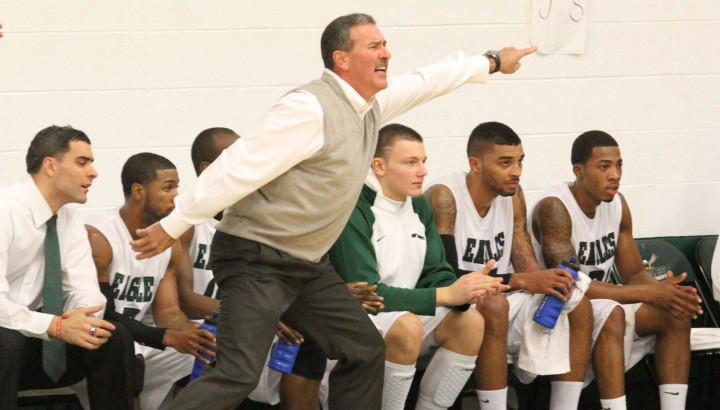- Attacking style not the only reason some Tottenham fans will back Ange Postecoglou until the bitter endPosted 5 months ago
- Paris Olympics takeaways: What did Team USA’s crunch-time lineup say about NBA’s hierarchy?Posted 10 months ago
- Zach Edey posted an easy double-double in Summer League debut. Here’s why he’ll succeed in NBAPosted 11 months ago
- What will we most remember these champion Boston Celtics for?Posted 12 months ago
- After long, seven-year road filled with excruciating losses, Celtics’ coast to NBA title felt ‘surreal’Posted 12 months ago
- South Florida men’s basketball is on an unbelievable heater– but also still on the bubblePosted 1 year ago
- Kobe Bufkin is balling out for Atlanta Hawks’ G League team. When will he be called up to NBA?Posted 1 year ago
- Former Knicks guards Immanuel Quickley, RJ Barrett may yet prove Raptors won the OG Anunoby tradePosted 1 year ago
- Rebounding savant Oscar Tshiebwe finally gets NBA chance he’s deserved for yearsPosted 1 year ago
- Is Tyrese Maxey vs. Tyrese Haliburton the next great NBA guard rivalry?Posted 2 years ago
Post University’s Al Sokaitis: The Most Interesting Coach in the World
- Updated: May 18, 2011
Post University men’s basketball coach Al Sokaitis is a walking Dos Equis commercial.
Don’t believe me? Here, cue the music:
He was named the head coach of the Tanzanian national basketball team even though he’s never been to Tanzania.
He once coached women’s and men’s teams—at the same time.
He’s coached teams in Israel, Alaska, Washington, California, Colorado, Maine, Massachusetts, and Connecticut.
His moustache is so glorious, it makes Bert Reynolds look like a hobo.
(OK, so I made up the last one).
Still, there’s no arguing it—Al Sokaitis is the Most Interesting Coach in the World.
Not even the wanderlust-stricken Larry Brown can match Sokaitis’ adventurous track record. And few coaches own his incredible knack for taking on reclamation projects.
In 1977, Sokaitis took over an E.O. Smith High School program that had never finished above .500. In two years, he had them in the state semifinals, with a 21-4 record. The next year, he took over a similarly downtrodden program at Thompson Valley High in Loveland, Colo., and guided them to a second-place finish in the state tournament. In 1986, Sokaitis led another program with a history of losing, Olympia High School in Washington, to its first-ever state title.
At the University of Alaska-Fairbanks, Sokaitis transformed a program that had experienced just two winning seasons in the previous 15 years into one of the best in Division II. Sokaitis’ teams became a regular in the D-2 NCAA Tournament and posted a 43-15 record from 2002-04. The Nanooks also made history by becoming the first Division II team to win a Division I tournament, knocking off Wisconsin-Green Bay, Nebraska, and Weber State capturing the BP Top of the World Classic on their home court in 2002. Sokaitis is a legend in Alaska, having also coached the Alaska Dream of the ABA in 2008-09. He’s even been inducted into the Alaska State Hall of Fame.
He’s done a nice job at Post, too, guiding the Eagles to consecutive appearances in the CACC semifinals. Besides those places already listed, Sokaitis has coached at the University of California-Davis, Western State College in Colorado, North Adams State in Massachusetts, and the University of Southern Maine.
Sokaitis also run clinics in Greece, Lebanon and Japan, and worked as a private instructor with NBA players. He makes the Dos Equis Most Interesting Man look like a couch potato.
But the (strangest? Craziest? Most awesome?) job of all came calling this past summer, when the national committee of Tanzania decided that he was the man to take over the country’s basketball program.
“They were talking to some coaches about starting a national program that could compete at the Olympic level,” he said. “And I guess my name came up a few times,” he said.
Sokaitis is confident and incredibly positive. He’s also demanding, charismatic, caring, and a perfectionist. He speaks with authority and passion, and although he can be loud and demonstrative on the sidelines, he’s the kind of coach that players want to play for, want to win for, and never disappoint.
In 2010, Sokaitis agreed to make fun of himself in the video below. I was working for Post at the time as the assistant sports information director, and I thought that this video would perfectly encapsulate his incredible journey.
When we met up with him, he was in full character, ready to go. The shot of him instructing the polar bears on where to stand is off the cuff—he was literally doing that to show where they should be for the shot. He also stood at half court and took shot after shot from behind his back without looking–until he knocked it down. When we told him that it could just be edited in, he replied: “I want it to be authentic.”
As with everywhere he’s been, Sokaitis expects to win in Tanzania. His team will look to compete with African countries like Tunisia and Nigeria, which both qualified for the 2012 Summer Olympics in London. Sokaitis said that his ultimate goal is to qualify for the Olympics, and that it starts with finding quality players and convincing the country’s best athletes to play basketball.
That may prove to be a challenge, as Tanzania hasn’t qualified for AfroBasket, which is the continent’s Olympic qualifying tournament, since 1974. In order to qualify for that tournament, a country must win enough games in its African regional zone tournament. (Africa is split up into seven regional zones). Tanzania is located in Zone 5, which also consists of Burundi, Djibouti, Eritrea, Ethiopia, Kenya, Rwanda, Somalia, Sudan, and Uganda. None of those countries have ever qualified for the Olympics in basketball.
Though there’s not much basketball history in Tanzania, there is some hope for the future. Former UConn center and No. 2 pick in the 2010 NBA draft Hasheem Thabeet is from Dar Es Salaam, the nation’s capital.
Thabeet has never played for the national team, mostly because it competes in qualifying rounds during times that conflict with his NBA schedule. (He is currently a reserve on the Oklahoma City Thunder). But if Sokaitis can convince him to join the squad, it could stand a chance of at least winning its zone and advancing to AfroBasket.
Beyond suiting him up, Sokaitis could use Thabeet to help recruit players and develop the sport. Thabeet runs clinics in the country, and has said that his goal is to provide youngsters with the same values and opportunities that he enjoyed.
Sokaitis said that he doesn’t think much about his duties with Tanzania during the season with Post, but that his focus will shift come summertime. He has coaches working camps and clinics now, scouring the country for talent and developing players.
“There’s a lot of potential there, and we need to tap into it,” he said. “I don’t know what it is, but I love rebuilding projects, and this is going to be a challenge.”
Sokaitis loves challenges, and he loves new surroundings. For him, this is the opportunity of a lifetime.
Whatever happens in Tanzania, one thing is for sure:
It’s going to be interesting.
Also see:
In conference realignment craziness, a plea UConn won’t join the fray

